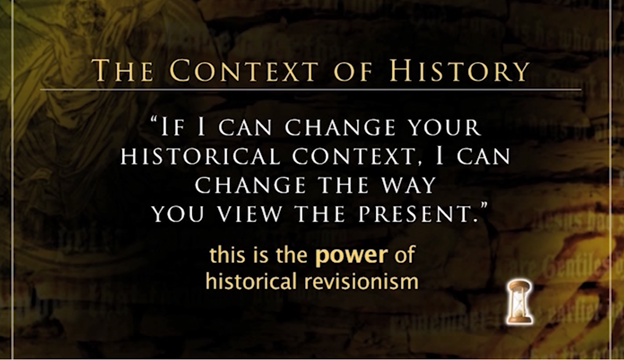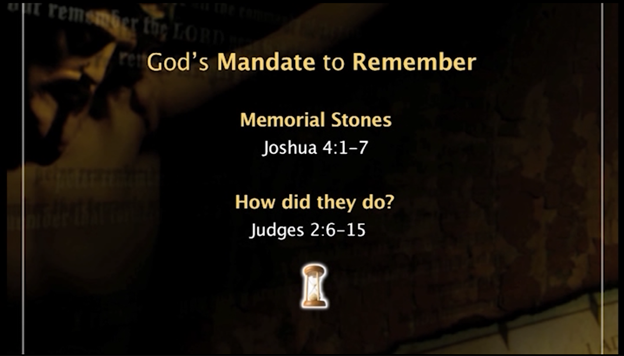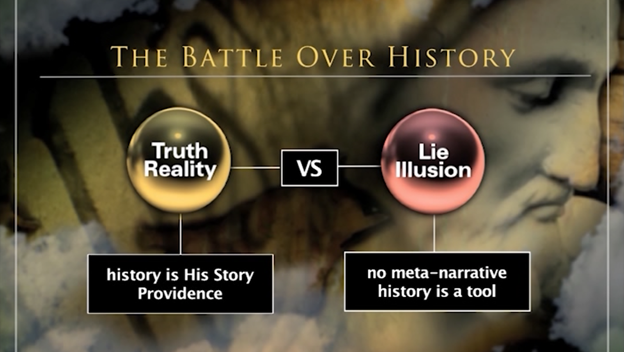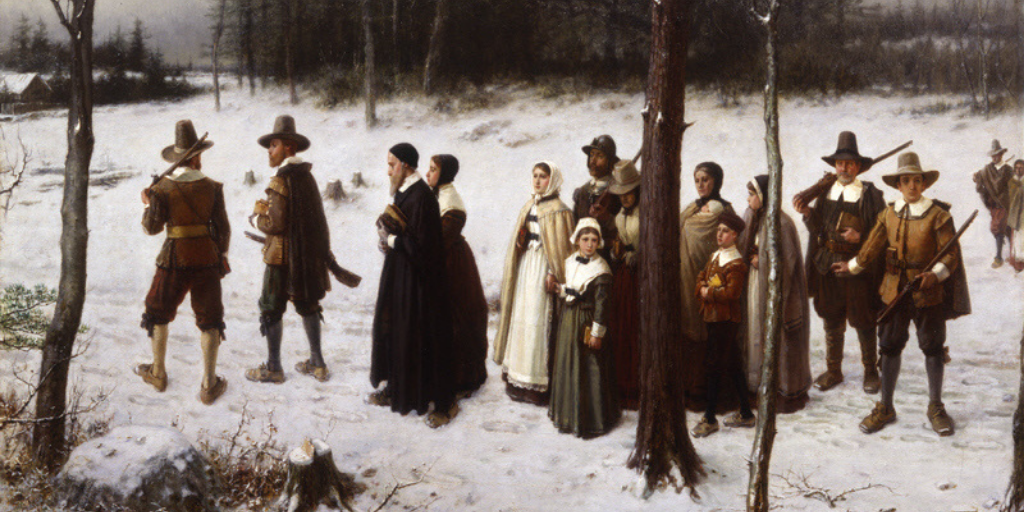This post is part 6 of a 12 part series about The Truth Project, an in-depth Christian Worldview experience led by Del Tackett and published by Focus on the Family.
Dr. Del Tackett opened up this lesson on history with a statement about the sovereignty of God. That is, God controls all things. Isaiah wrote about God controlling all things many centuries before Christ:
“Remember this and stand firm,
recall it to mind, you transgressors,
remember the former things of old;
for I am God, and there is no other;
I am God, and there is none like me,
declaring the end from the beginning
and from ancient times things not yet done,
saying, ‘My counsel shall stand, and I will accomplish all my purpose,’
calling a bird of prey from the east,
the man of my counsel from a far country.
I have spoken, and I will bring it to pass;
I have purposed, and I will do it.
(Isaiah 46:8-11)
By controlling all things, God ensures the outcomes he desires. God is in control of the future as well as the past. It is in this context that Tackett introduces the subject of history.
The Past: A Key To Our Present
The past is the key to our understanding of our present. We understand little about our present without reference to our past. For instance, if we were to look at the numbers and symbol “9/11”, much comes to mind related to our past. For instance, we know of the numbers “9” and “11” from early schooling. Moreover, we also know that “9/11” relates to the day September 11, 2001 when 4 planes were flown into 3 buildings and an empty field, an event which catapulted the world into “The War on Terror.” Our present understanding of the numbers and symbol “9/11” is dependent upon our understanding of the past. And this is just one example of how our present knowledge is affected by our past education.
There’s also a powerful takeaway from this perspective on knowledge. Tackett said, “If I can change your historical context, I can change the way you view the present. This is the power of historical revisionism.”
Others agree with this understanding that there is great power in influencing people’s perspective about the past. George Orwell wrote, “He who controls the past, controls the future.” Karl Marx also said, “A people without a heritage are easily persuaded.” For this reason, those who want to change the future direction of a people are very interested in influencing their understanding of the past.

Historical revisionism is not new. The first words out of the serpent’s mouth in the garden of Eden was “did God really say?” (Genesis 3:1, NIV) Satan’s suggestion to Eve was aimed for her to doubt God’s command in the past. He revised history, which was a lie. The same kind of revision happens in other times whenever leaders want people to believe different things about the past. That will affect the way people believe the present.
Historical Revisionist Attacks Against the Bible
In the same way, many unbelievers attack the veracity of the Bible by casting doubt on the integrity of the original text. They say there’s no way for the Bible to have maintained it’s original message for thousands of years ago. Funny, how the same argument is usually not attached to other ancient documents. There is far less textual support for non-biblical documents than there are for biblical documents. Tackett provided these numbers of ancient manuscripts to compare against the extant biblical documents in the original and other ancient languages:
- Homer’s Iliad: 643
- Julius Caesar’s Gallic Wars: 10
- Pliny’s History: 7
- Thucydides’ History: 8
- Herodotus’ History: 8
- New Testament: > 24,000
In other words, we have far greater reason to trust the New Testament than other ancient documents. For a more updated bibliographical argument, check out Case-Making 101: How does the Bible compare to other ancient documents?
God’s Commands to Remember & Providence
In Scripture, God told the people of God to remember his acts. In one instance, God told Israel to take up stones and pile them up along the banks of the Jordan River to remind future generations of God’s acts of deliverance (Joshua 4:1-9). God had just saved the entire nation of Israel from being slaves in Egypt and they were finally entering the Promised Land. The first command he gave them after they crossed the Jordan River was to build a memorial to the event. So God would tell Israel to remember particular events throughout their history.

The consequences of forgetting God’s activity in history can be fatal to the future of any people. When a people forget their history, then they are ripe for a takeover of other leaders who will rewrite history for the sake of the new regime.
So there is a responsibility for God’s people to remember history. But there’s also another aspect of God’s interaction in history. This is the doctrine of providence. Providence entails God’s control and guidance of history throughout time. This is an aspect related to God’s sovereignty.
The biblical reference Tackett used to support providence is the story of King Ahab’s death in 1 Kings 22:1-40. In this account, the prophet Micaiah prophesied to Ahab that he would die in battle. Ahab was concerned and then disguised himself in battle as a regular soldier to avoid detection by the Syrian army. In the middle of battle, a soldier “drew his bow at random and struck the king of Israel between the scale armor and the breastplate” and mortally injured the king. So the word of Micaiah was fulfilled, even though the king attempted to stay anonymous in battle. This is how God’s providence works. God’s desire for an outcome will be fulfilled in individual battles and throughout all history.
Postmodernism on History
God’s perspective on history alongside providence is contrasted with a postmodern understanding of the past. In fact, postmodernism is built on disbelieving such order in the universe. The philosopher Jean-François Lyotard wrote, “Simplifying to the extreme, I define postmodern as incredulity toward meta-narratives.” Tackett defined meta-narrative as “any ‘large story’ that pretends to give an all-encompassing explanation of anything, especially an overarching story of history and life in an attempt to legitimize some version of truth.” In other words, Lyotard suggests there is no structure to the world that ultimately makes sense of reality.

The implication of a postmodern understanding of history is tragic. Postmodernism strips ultimate meaning from our experience. If God is not in control of history through providence, history can be a series of competing stories about the past, each one used to manipulate a people’s understanding of reality. In postmodernism, historical narrative is a tool to be wielded to sway a people. It’s a sad perspective, but one that makes sense in a naturalistic universe.
Application: Confidence in the God Who Orders History
We have a wonderful heritage in believing God orders the universe throughout history. When we trust God’s direction through a nation, a church, a family, and our individual lives, we live with a measure of order that is impossible without such beliefs.
Tackett concluded this segment with the story of the English separatist colonists known as the Pilgrims. In 1620, the settlers landed and nearly half of them died in the subsequent year. It was a tough year. It was a year that would have sent many people back home, but not these pilgrims. When the Mayflower returned to England, none of the settlers returned with the ship. William Bradford, Governor of the Plymouth colony, explained, “But these things did not dismay them (though they did sometimes trouble them) for their desires were set in the ways of God, and to enjoy His ordinances; but they rested on His Providence and knew whom they had believed.”
The Pilgrims believed they were part of the larger story God was writing. So despite the hardship, toil, and death that surrounded them, they stayed. And they built a colony that would one day be celebrated every Thanksgiving in our country. This is the power of a people who are connected to history and to God’s hand in history through providence. In the same way, we can trust in the God who orders everything for his glory and our good.
—–
Header image: Pilgrims Going To Church (1867) — originally The Early Puritans of New England Going to Church — is a painting by Anglo-American painter George Henry Boughton courtesy of Wikipedia.



